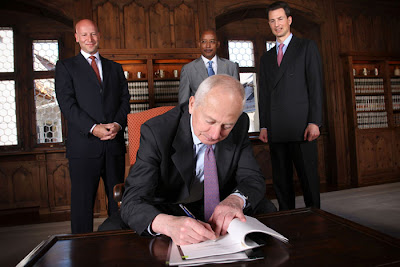 |
| “You see this? This is what I’m going to do to your referendum.” |
Liechtenstein may be a constitutional rather than an absolute monarchy, but don’t confuse His Serene Highness Hans-Adam II with one of those ornamental vestiges of royalty that pass for monarchs in the normal-sized countries of Europe. He has real power — or his son does, since Prince Alois was appointed regent in 2004 — including vetoing legislation, calling elections, and dismissing ministers. Just a few months ago, Prince Alois effectively killed a referendum that would have legalized first-trimester abortions by promising to veto the law if it passed — which it did not, partly because its supporters were overwhelmed by a sudden sense of futility that sapped them of the will to turn out on election day.
After that display of power, Liechtenstein’s pro-choicers and democratizers teamed up to promote a referendum that would strip the prince of his veto power — a measure that Prince Alois, like Coriolanus shouting “I banish you ” to the fickle plebeians of Rome, has promised to veto . (Well, not quite like Coriolanus; Prince Alois a soft-spoken banker.) This pretty paradox could trigger a sixty-square-mile constitutional crisis.
Liechtenstein’s monarchy is one of the jewels of Mitteleuropean government, right up there with the canton system of Switzerland. And with the highest per capita GDP in Europe, it’s not as if Liechtenstein’s democracy movement has any concrete objection to the hereditary monarch apart from his being a hereditary monarch. If the supporters of this referendum have no better argument than a general faith in democracy, then speaking as a citizen of a democracy, I would advise them to reconsider.
Deliver Us from Evil
In a recent New York Times article entitled “Freedom With a Side of Guilt: How Food Delivery…
Natural Law Needs Revelation
Natural law theory teaches that God embedded a teleological moral order in the world, such that things…
Letters
Glenn C. Loury makes several points with which I can’t possibly disagree (“Tucker and the Right,” January…

